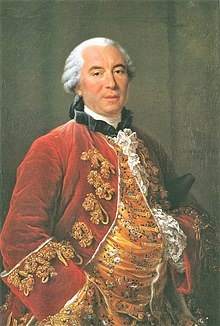
Back جورج دي بوفون Arabic جورج دى بوفون ARZ Georges Louis Leclerc AST Jorj-Lui Lekler de Büffon Azerbaijani ژرژ-لوئی لکرک کنت دو بوفون AZB Жорж-Луі Леклерк дэ Бюфон Byelorussian Жорж Люі ле Клерк дэ Б’юфон BE-X-OLD Жорж-Луи Леклерк дьо Бюфон Bulgarian জর্জ-লুই ল্যক্লের, কোঁত দ্য বুফোঁ Bengali/Bangla Georges-Louis Leclerc de Buffon Breton
Georges-Louis Leclerc, Comte de Buffon | |
|---|---|
 Painting by François-Hubert Drouais | |
| Born | Georges-Louis Leclerc 7 September 1707 |
| Died | 16 April 1788 (aged 80) Paris, France |
| Known for | Histoire Naturelle (1749–1804) Buffon's needle problem Rejection sampling |
| Scientific career | |
| Fields | Natural history |
| Institutions | Académie Française |
| Signature | |
 | |
Georges-Louis Leclerc, Comte de Buffon (French: [ʒɔʁʒ lwi ləklɛʁ kɔ̃t də byfɔ̃]; 7 September 1707 – 16 April 1788) was a French naturalist, mathematician, and cosmologist. He held the position of intendant (director) at the Jardin du Roi, now called the Jardin des plantes.
Buffon's works influenced the next two generations of naturalists, including two prominent French scientists Jean-Baptiste Lamarck and Georges Cuvier. Buffon published thirty-six quarto volumes of his Histoire Naturelle during his lifetime, with additional volumes based on his notes and further research being published in the two decades following his death.[1]
Ernst Mayr wrote that "Truly, Buffon was the father of all thought in natural history in the second half of the 18th century".[2] Credited with being one of the first naturalists to recognize ecological succession, he was later forced by the theology committee at the University of Paris to recant his theories about geological history and animal evolution because they contradicted the biblical narrative of Creation.[3][4]
- ^ Farber, Paul (2000). Finding Order in Nature. Baltimore: Johns Hopkins University Press. p. 14.
- ^ Mayr, Ernst 1981. The Growth of Biological Thought. Cambridge: Harvard. p 330
- ^ Brody, David Eliot (6 August 2013). The Science Class You Wish You Had. Penguin. ISBN 9780399160325.
- ^ Larsen, James A. (22 October 2013). Ecology of the Northern Lowland Bogs and Conifer Forests. Elsevier. ISBN 9781483269863.